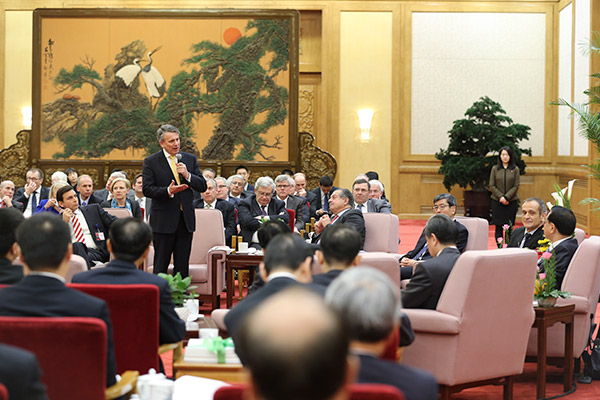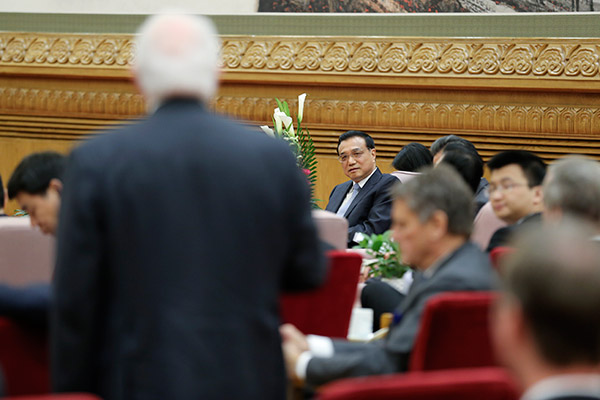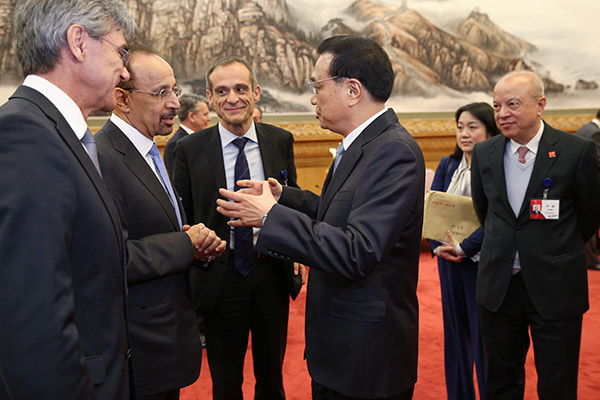
Premier Li Keqiang meets foreign guests attending the China Development Forum 2015 in Beijing on March 23, 2015.[Photo by Liu Zhen/China News Service]
Premier Li Keqiang met international business leaders and top academics on March 23 for a question-and-answer session where many of the guests had the opportunity to select traditional Chinese names.
The moderator of the event, Jean-Pascal Tricoire, CEO and chairman of the multinational electricity company Schneider Electric, chose the name Zhao Guohua, as Zhao is a popular Chinese family name.
Ellen Kullman, chair and CEO of DuPont, asked the first question, using her Chinese name Ke Ailun, similar in pronunciation to her English name.
Kullman asked what foreign investment and technology can do while China is entering the “new normal”.
Li said the service sector in China has limited experience at the medium and top levels, which need the inflow of foreign investment. To reach a win-win situation, an organized, step-by-step opening process to let more foreign investment in is needed, he added.
In terms of the manufacturing sector, Li said China will have greater demands for high-end foreign technology and products. He expressed his hope to see more countries loosen their restrictions on exporting high technology and high-tech products to China.

Li also mentioned that China has many products of excessive production capacity, like steel, cement and nonferrous metal, which will be exported to some developing countries to provide a win-win situation. The growing demands for high-end technology and equipment provide opportunities for China to cooperate with foreign countries in third-party markets.
Joseph Stiglitz, a Nobel Prize-winning economic professor at Columbia University, asked the Premier about social equality.
Li said China has secured great achievements since the reform and opening-up policy was initiated more than three decades ago. But the gap between the rich and poor has also widened, especially between city and villages, and among different areas. To tackle the issue, the Chinese government has proposed to build “double engines” for the economy.
One engine is to invest more in public products and services, especially in central and western regions and rural areas, he said.
The other engine is to encourage the public to start up businesses and innovate. The government will offer a fair environment for people to do business more easily at a lower cost, which will give young people, especially those from poor families, a chance to improve their social status, Li said.
Li also stressed that the government is responsible for ensuring the basic livelihood of all people, satisfying essential needs of the poor and offering a safety net for entrepreneurs who fail so that they can start over.
The Premier suggested Stiglitz go to the makers’ spaces in many cities and see the enthusiasm of ordinary people starting their own businesses.

Martin Wolf, chief economics commentator at the Financial Times, asked the Premier about how China will adjust its demand structure.
Li said China has great opportunities to stimulate consumption so as to adjust the demand structure. Consumption demand rose to 52 percent of the entire economic structure last year. In the following step, China will focus on developing the service sector.
Wolf asked a follow-up question to Li regarding financial risk in China.
“In general, the financial risk in China is within the safety zone and under control. We are able to make sure no regional and systematical risks may occur,” Li said before joking “but if you say I’m not worried at all, I’d be able to go back home and sleep’’.
Li’s answer evoked laughter. He admitted that some cases of financial risks have occurred in some places, but unlike before, the central government has decided to tackle them using market-oriented methods. An insurance policy for deposits will come out this year, which will benefit the development of small banks and private banks and enable finance to serve small companies more directly.
